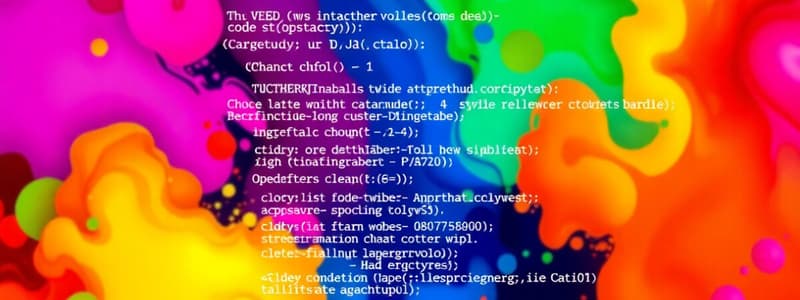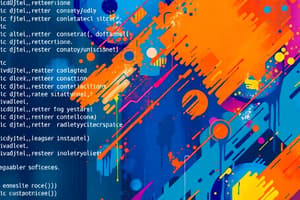Podcast
Questions and Answers
What is the primary objective of clean code practices?
What is the primary objective of clean code practices?
- To maximize the execution speed of the code
- To ensure that code is easily understandable and maintainable (correct)
- To reduce the number of lines of code
- To create a codebase that is visually appealing
Which of the following is NOT a principle of clean coding?
Which of the following is NOT a principle of clean coding?
- Use meaningful variable names
- Refactor code regularly
- Comment every line of code (correct)
- Keep functions short and focused
What does refactoring code mean?
What does refactoring code mean?
- Removing comments from the code
- Debugging code to fix errors
- Improving the internal structure of code without changing its external behavior (correct)
- Simply writing new features in the existing code
Why is it important to use meaningful names for variables and functions?
Why is it important to use meaningful names for variables and functions?
What is the impact of having long functions in your code?
What is the impact of having long functions in your code?
Flashcards
Refactoring Code
Refactoring Code
Improving code's internal structure without changing its external behavior, enhancing readability and maintainability.
Meaningful Names
Meaningful Names
Variable and function names should clearly indicate their purpose, making code easier to understand and maintain.
Impact of Long Functions
Impact of Long Functions
Long functions are difficult to understand, test, and maintain due to excessive logic. Aim for short, focused functions.
Clean code objectives
Clean code objectives
Signup and view all the flashcards
Refactoring
Refactoring
Signup and view all the flashcards
Study Notes
Clean Code Objectives
- Primary objective is to improve code readability, maintainability, and understandability.
- This enhances code quality and enables easier collaboration among developers.
Clean Code Principles
- Not a Principle: While adhering to code style conventions is crucial, it's not a core principle of clean coding. Focus is on the logic and structure of the code itself.
Refactoring Code
- Refactoring involves improving the internal structure of existing code without altering its external behavior. This process enhances its readability, maintainability, and efficiency.
Meaningful Names
- Variable and function names should clearly communicate their purpose and role in the code.
- Using descriptive names makes the code easier to understand and maintain, reducing confusion for developers.
Long Functions Impact
- Long functions are harder to understand, test, and maintain. They often contain too much logic and become difficult to debug.
- The ideal goal is to maintain short, focused functions that perform specific and well-defined tasks.
Clean Coding Objectives
- To improve code readability and maintainability
- To reduce the likelihood of errors and bugs
- To facilitate collaboration among developers
- To simplify future code modifications
Principles of Clean Coding
- Clarity: Code should be easy to understand and follow.
- Simplicity: Code should be concise and avoid unnecessary complexity.
- Consistency: Code should adhere to a consistent style and formatting.
- Testability: Code should be easily testable.
- Efficiency: Code should be optimized for performance.
Refactoring
- Refactoring refers to the process of restructuring existing code without altering its external behavior.
- It aims to improve the code's design, readability, and maintainability.
- It typically involves renaming variables, extracting methods, or simplifying logic.
Meaningful Names
- Variables and functions with descriptive names are easier to understand and remember.
- Using clear and concise names makes it easier to follow the flow of code and debug potential issues.
Long Functions
- Long functions are often difficult to read and understand.
- They can be hard to test and maintain.
- They can make it harder to identify and fix errors.
- It is generally recommended to break down large functions into smaller, more manageable units.
Studying That Suits You
Use AI to generate personalized quizzes and flashcards to suit your learning preferences.




